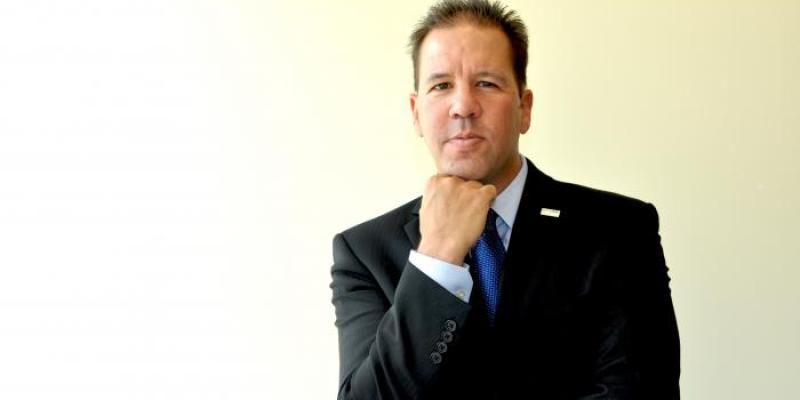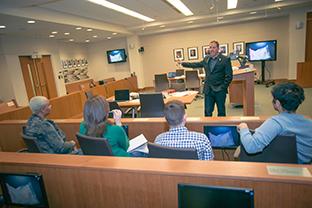
CSU Cleveland-Marshall College of Law Professor Doron Kalir has been selected as the 2022 recipient of the Dean Wilson G. Stapleton Award for Faculty Excellence. He will receive his award at the Cleveland-Marshall Law Alumni Association Annual Luncheon on May 26.
The award is named for CSU C|M|LAW Hall of Fame member Dean Wilson G. Stapleton ’34, who served the law school for 32 years as a faculty member and later as dean.
“It is truly a tremendous honor for me to be even considered for the Award, let alone winning it,” said Kalir.
Professor Kalir joined the CSU C|M|LAW faculty in 2012. He has recently been quoted as a legal expert on the Supreme Court and its decisions by several national publications including Newsweek and Business Insider.
Kalir directs and teaches in the law school’s Appellate Practice Clinic, where students represent underprivileged communities, in addition to teaching Contracts.
Under Professor Kalir’s direction, the Appellate Practice Clinic has experienced tremendous success, including winning its last three appeals with the U.S. Sixth Circuit Court of Appeals and several others before the 8th District Court of Appeals.

“We are very blessed for having students who are truly passionate about the cause,” explained Kalir. “Whether we represent prisoners who were poorly represented at trial; immigrants who are deported for no good reason; members of our local community who cannot afford legal representation but need to fight adverse parties who ‘lawyered up’ – in each case our students took the case with utmost seriousness, and produced excellent briefs for the Court.”
Representing underprivileged communities – such as persons afflicted with homelessness, immigrants, LGBTQ members, and others – before state and federal appeals courts, students learn how to perfect an appeal, author a brief, and present oral argument. But they also learn about the struggles some face while interacting with the justice system. Kalir points to some of the Clinic’s current cases – an aunt who only wanted to become her niece's guardian but has to face a lawyer on the other side; a prisoner who went to prison for 23 years due to his trial-attorney's bad advice and now attempts to argue pro se against the United States government; an immigrant who was denied a stay of deportation proceedings despite a change in the government policy – as examples of cases where students are learning to create legal work-product at the highest level while serving a greater need.
“The fact is those who can’t afford legal representation usually need it the most. Bryan Stevenson famously taught us that ‘the opposite of poverty is not wealth but justice’,” said Kalir. “The least fortunate among us are the ones the need the best representation. That is the kind of representation we’re trying to provide.”
Professor Kalir’s most recent publication, The Inner Logic of Bostock published by the Wake Forest Law Review Online in 2021, examines protections provided to one of those underrepresented communities – LGBTQ members – by the United States Supreme Court in their decision on Bostock v. Clayton County. His article explains how a formal logic model was used in the seminal opinion, where a conservative Supreme Court granted extremely wide protections to LGBTQ employees under Title VII of the Civil Rights Act of 1964.
Born and raised in Israel, Kalir became interested in the law from a very early age, inspired by his father who was a lawyer and also “the wisest person he’s ever met.” When he was 12, Kalir was particularly inspired after reading “Courtroom” by Quentin Reynolds – a book about a Jewish lawyer Sam Leibowitz, who came to America from Europe and became one of this country’s most prominent defense attorneys. But before studying law, Kalir completed a full military service in his home country.
Speaking on the impact of his military service on his legal career, Kalir told Cleveland Jewish News in a profile earlier this year, “The notion of right and wrong, and the idea that power should never be abused were well entrenched during my service, and are still with me today… I realized that the rule of law must apply to the actions of the military as well. No one – including the military – can be above the law.”
Kalir first studied law in Israel at the Hebrew University Law School where he completed LL.B and LL.M degrees. He then came to the United States and earned an LL.M. degree from Columbia Law School. Kalir worked in private practice – mostly for Skadden, Arps in New York City – as an antitrust Attorney for several years before joining the Cleveland-Marshall faculty.
Professor Kalir knows he has found his calling in teaching. When he interviewed to join the Cleveland-Marshall faculty, he told the interview committee that if accepted, he would “whistle every day on my way to work.” To this day, he sometimes finds himself doing just that.
“I always loved teaching law,” explained Kalir. “I have been teaching since my third year of law school, and never stopped since. The energy the students bring, the back and forth, the fact that they always, always keep you on your toes, makes this profession the best in the world, by far. It’s truly a dream-come-true.”
